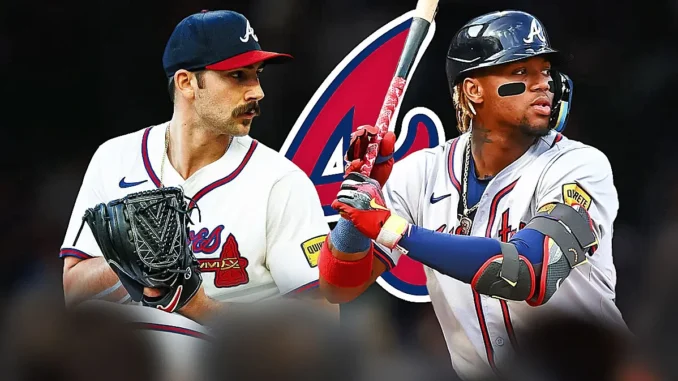
The Atlanta Braves have been one of baseball’s most consistent powerhouses in recent years, but their approach to the 2025 offseason has raised eyebrows. While other teams are making splashy signings and aggressive trades, Atlanta has taken a more measured approach. One possible explanation? The long-term financial commitments to Ronald Acuña Jr. and Spencer Strider may be influencing the team’s offseason strategy.
Acuña and Strider are cornerstones of the Braves’ roster and represent two of the most impactful contracts in baseball. Acuña, fresh off an MVP-winning 2023 season in which he became the first player in MLB history to hit 40 home runs and steal 70 bases, is locked up through 2028 on a remarkably team-friendly deal. Similarly, Strider, who has emerged as one of the league’s premier strikeout artists, signed a six-year, $75 million extension in 2022. These deals provide the Braves cost certainty for two of their stars but also limit how much they can spend in free agency without exceeding payroll thresholds.
The Braves’ ownership group has made it clear they prefer to operate within a specific budget, and Atlanta’s front office is known for its calculated, value-driven moves. Rather than chase big-name free agents or risky contracts, the team has prioritized locking in its homegrown talent, such as Matt Olson, Austin Riley, and Michael Harris II. While this strategy has built a strong core, it leaves less room for flashy acquisitions.
Another factor is that the Braves already boast a competitive roster with few glaring holes. The lineup is stacked with talent, and their pitching staff, headlined by Strider and Max Fried, remains formidable. Instead of rushing to fill needs with external options, Atlanta could be waiting for the right opportunities to add complementary pieces via trade or affordable signings later in the offseason.
The Braves’ slow-playing approach might also reflect confidence in their internal pipeline. Prospects like AJ Smith-Shawver and Vaughn Grissom are poised to make an impact, giving the team additional depth without requiring heavy spending.
Ultimately, the Braves’ deliberate offseason isn’t cause for alarm—it’s part of their long-term vision. With Acuña and Strider anchoring the team for years to come, Atlanta is positioning itself for sustained success rather than a short-term splash. Fans may need patience, but the Braves’ track record suggests their methodical approach will pay off when it matters most: October.
Leave a Reply